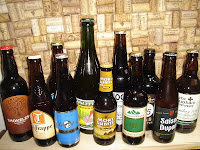I saw recently that there is a
World Atlas of Beer
coming out in the autumn, and I'm fascinated as to what it's going to contain.
 |
| Image from Amazon UK |
The reasoning behind the
The World Atlas of Wine
, an indispensable book for anyone working in wine (so much so that I've ended up with three copies) is more simple; it's about
terroir. At its most simplified
terroir can be defined as how geographical differences result in variations from one area to the next. The World Atlas of Wine's maps focus on the overground; climate and topography, but equally important are geological differences covered by books such as James E. Wilson's
Terroir: Role of Geology, Climate and Culture in the Making of French Wines
.
The World Atlas of Whisky
is different because, in the same way as almost all beer, whisky's vast array of flavours are not a product of
terroir, although there are regional characteristics. As Dave Broom wrote:
It would be wrong to assume that whisky demonstrates the effect of terroir in the same way as Cognac or Armagnac... the reasons whisky can have a shared character come from other factors: cultural, historical and commercial, as well as geographical.1
These other factors are, of course, equally valid subjects for an atlas, be it about beer or whisky. The whisky industry does, however, move at a far slower pace than brewing. By definition a distillery has to have been there for over three years (in Scotland at least) before it can even make whisky, so new whisky distilleries don't so much pop up as rise serenely over time. This means the book isn't going to date particularly quickly. There are also far fewer whisky distilleries in the entire world than breweries in some individual countries, and so the background and history of them can be detailed, which I'm not sure is possible with breweries. This is especially true if Amazon's report of the World Atlas of Beer being 256 pages long is correct, which seems a bit lightweight to me (the current, 6th edition, of the World Atlas of Wine runs to 400 pages).
In terms of beer academia I'm interested in seeing what the World Atlas of Beer covers that isn't covered by the
The Oxford Companion to Beer
(and if the Oxford Companion didn't cover it, why not?) With regard to the maps it will be intriguing to find out what information (other than simple location) is seen as important - will there be maps of hop-growing areas? I'm glad that beer is approaching being given an equal footing in the realm of serious drinks publications and I'm looking forward to finding out what's in the atlas and why. If, like me, you're excited but a little sceptical then your speculation is welcome!
1. Broom, D, 2006. Distilling Knowledge, Wine and Spirit Education Trust. ↩






